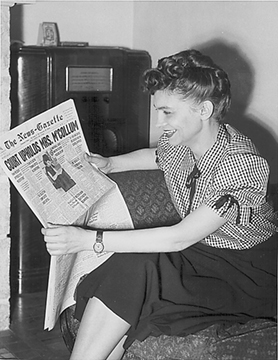By Annie Laurie Gaylor
Co-President, Freedom From Religion Foundation

Not one workday ever goes by that we at the Freedom From Religion Foundation do not give thanks — to the McCollum family for the landmark ruling they won. We must pause this Friday, March 8, to give special thanks to the achievement of Vashti McCollum and her family. Friday marks the 65th anniversary of the Supreme Court decision in McCollum v. Board of Education, a decision that endures and protects schoolchildren and personal conscience throughout the land.
FFRF daily invokes the McCollum precedent in our legal letters of complaint over state/church violations in public schools. McCollum, issued in 1948, is the bedrock upon which rests all other Supreme Court rulings against religious encroachments and devotions in public schools. (We also more than pleased to invoke the McCollum precedent in Doe v. Porter, FFRF’s 2004 victory in the 6th Circuit U.S. Circuit Court of Appeals nixing devotional instruction taught by bible students in Dayton, Tenn.)
I’m writing this tribute en route to a celebration of that decision in the city of origin, Champaign, Ill., where Vashti brought her brave and unpopular challenge. As professor George Axtelle wrote about Vashti: “Very few persons would have been willing to stand up, as she did, not only to the authorities but also to the hostility of the whole community. Here, indeed, is a story of rare courage.”
The University of Illinois at Champaign-Urbana, under the leadership of professor Jay Rosenstein, today will be airing Jay’s Peabody Award-winning documentary about the landmark case, “The Lord Is Not on Trial Here Today.” A famous remark at the trial also formed the title for Dannel McCollum’s book about his mother’s case as well, called The Lord Was Not on Trial. Jay was kind enough to invite me as a representative of the Freedom From Religion Foundation to be on the post-screening panel.
To ready myself for this panel, I’ve just reread Vashti’s memoir One Woman’s Fight and the McCollum decision. In the face of bitter defeat in two lower courts, social shunning, hate mail, reprisal against herself, her family and her children, Vashti did not give up. She was rewarded with a historic decision, 8-1, in her favor.
Justice Hugo Black wrote the main opinion, concluding: “Here not only are the state’s tax-supported public school buildings used for the dissemination of religious doctrines. The State also affords sectarian groups an invaluable aid in that it helps to provide pupils for their religious classes through use of the state’s compulsory public school machinery. This is not separation of Church and State.”
Four justices, represented by Justice Felix Frankfurter, issued a strong concurrence. Frankfurter wrote, “Separation means separation, not something less. Jefferson’s metaphor in describing the relation between Church and State speaks of a ‘wall of separation,’ not of a fine line easily overstepped. The public school is at once the symbol of our democracy and the most pervasive means for promoting our common destiny. In no activity of the State is it more vital to keep out divisive forces than in its schools, to avoid confusing, not to say fusing, what the Constitution sought to keep strictly apart. ‘The great American principle of eternal separation’ — Elihu Root’s phrase bears repetition — is one of the vital reliances of our Constitutional system for assuring unities among our people stronger than our diversities.”
One of the many great privileges of being an FFRF co-founder has been meeting and working with so many memorable champions of the First Amendment. In 1993, FFRF received permission to reprint Vashti’s remarkable, timely and engaging book, first published in 1951 (available at ffrf.org/shop).
In the foreword by FFRF President Anne Nicol Gaylor, Anne noted: “We are all of us indebted to Vashti for her activism in defense of a basic constitutional principle. And we are so please to know her — an intrepid and charming woman of great integrity.” It was a privilege to meet Vashti and her husband, John (“Pappy”), and their sons Jim and Dannel, who remain committed to championing the Establishment Clause. Pappy died before Vashti, who died in 2006 at age 93. Vashti, Jim and Dan were interviewed for FFRF’s 1989 film “Champions of the First Amendment.” Rosenstein’s documentary captures their words, the drama and the scope of this decision for posterity, and is a poignant lesson for today.
While we take a moment to savor this strong ruling, it must be noted that the Supreme Court has egregiously deviated from the principles in McCollum in its 2001 Good News Club v. Milford Central School District decision. What the court stopped during the school day, it now blesses as soon as the bell rings at the end of the school day.
A major child evangelism industry is permitted to set up shop in our public schools and use their machinery, truancy laws and classrooms to conduct child evangelism clubs of indoctrination. The Good News Club decision was bad news that cannot be squared with Justice Black’s analysis of what is impermissible in McCollum, nor can the Supreme Court’s green light on school voucher funding.
Nothing could inspire more state/church activism than reading Vashti’s One Woman’s Fight. Vashti won the big one. Now it’s up to the rest of us to keep mopping up!

